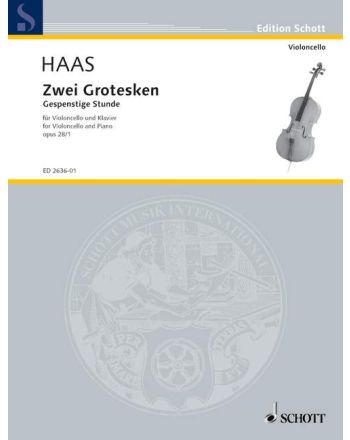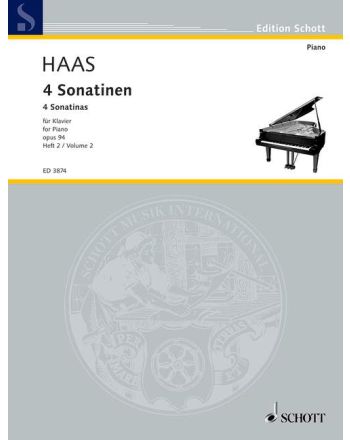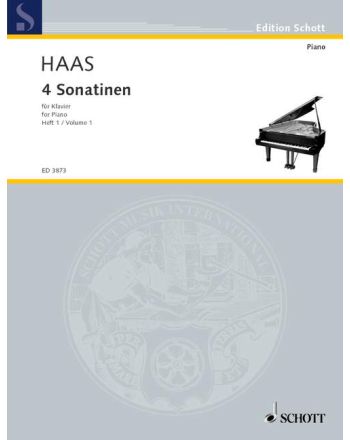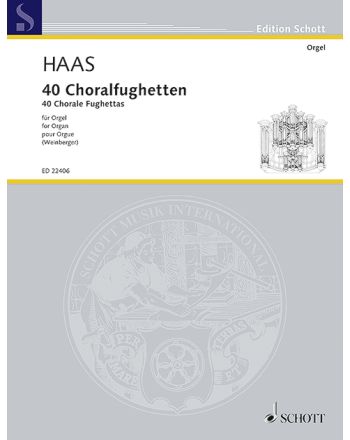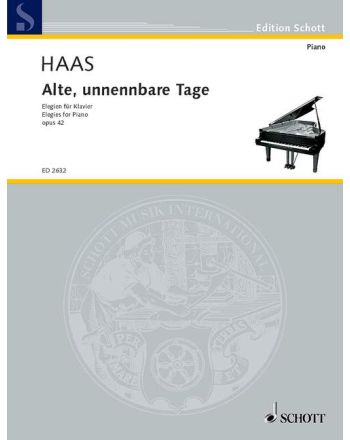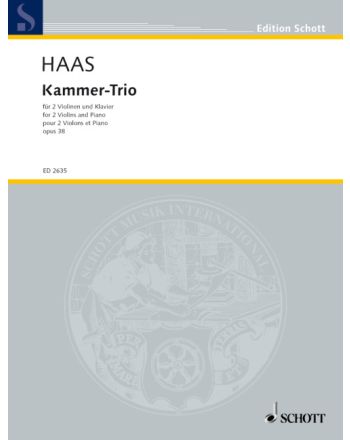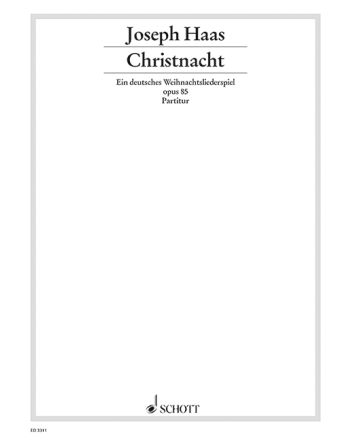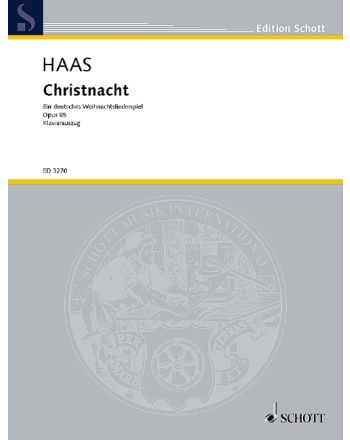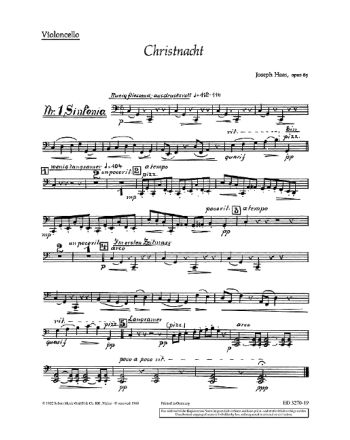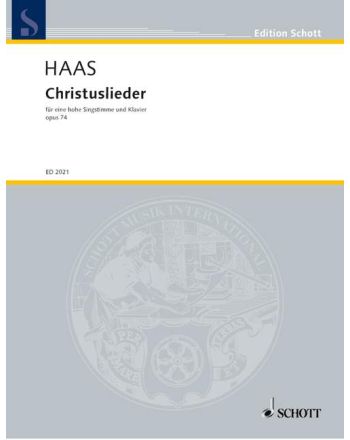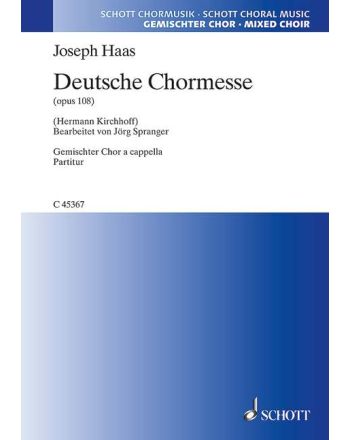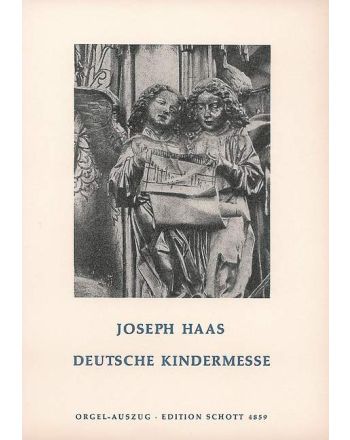
Joseph Haas
Country of origin:
Germany
Birthday:
March 19, 1879
Date of death:
March 30, 1960
About Joseph Haas
Joseph Haas was born in the Bavarian town of Maihingen near Nördlingen on 19 March 1879. The third child of the local teacher, he came into contact with domestic and church music at an early age and eventually took up a career as a primary school teacher himself. His encounter with Max Reger was crucial to his musical career. From 1904 Haas took private lessons with him in Munich and in 1907 followed him to Leipzig where he also studied with Karl Straube and Adolf Ruthardt at the local conservatoire.
In 1911 his first successes as composer and the award of the Arthur Nikisch Scholarship (for the Violin Sonata Op. 21) earned him an appointment as composition teacher at the Stuttgart Conservatoire. In 1921 he took a position at the Munich Akademie der Tonkunst where he was appointed professor in 1924, taking over the composition class and in 1925 even the direction of the Catholic church music department. In 1924 Haas, with Eduard Erdmann and Heinrich Burkhard, founded the Donaueschingen Festival for New Music, thus proving his open-mindedness about anything new, despite his always tonal compositions. In 1930 he became a member of the Preußische Akademie der Künste in Berlin. After 1945 he strove, as its president, to rebuild the Munich Hochschule für Musik.
Haas received numerous awards and honours, including honorary degrees from the University of Munich (1954) and the Papal Institute of Sacred Music in Rome (1953). He died in Munich on 30 March 1960. Taking part in many musical organisations, Haas supported not only artistic but also social and legal issues of the musicians. As teacher of a generation of composers and conductors such as Karl Amadeus Hartmann, Cesar Bresgen or Eugen Jochum and Wolfgang Sawallisch, he greatly influenced the recent musical development in Germany.
The comprehensive oeuvre of Joseph Haas comprises compositions from all compositional genres, such as for example the "folk" operas Tobias Wunderlich (1937) and Die Hochzeit des Jobs (1944) (both based on texts by Ludwig Andersen), the oratorios Die heilige Elisabeth (1931), Das Lebensbuch Gottes (1934), Das Jahr im Lied (1952), which are also accessible to amateur musicians, liturgical works, including masses in German such as the Speyerer Domfestmesse op. 80 (1930), as well as orchestral works, lieder, chamber music, piano and organ pieces. Haas' close-to-the-people style of composition gained him the reputation of being the "Spitzweg of modern piano music".
Please visit the homepage of the Joseph-Haas-Gesellschaft at www.joseph-haas.de
The comprehensive oeuvre of Joseph Haas comprises compositions from all compositional genres, such as for example the "folk" operas Tobias Wunderlich (1937) and Die Hochzeit des Jobs (1944) (both based on texts by Ludwig Andersen), the oratorios Die heilige Elisabeth (1931), Das Lebensbuch Gottes (1934), Das Jahr im Lied (1952), which are also accessible to amateur musicians, liturgical works, including masses in German such as the Speyerer Domfestmesse op. 80 (1930), as well as orchestral works, lieder, chamber music, piano and organ pieces. Haas' close-to-the-people style of composition gained him the reputation of being the "Spitzweg of modern piano music".
Please visit the homepage of the Joseph-Haas-Gesellschaft at www.joseph-haas.de
Chronology
1879
Geburtstag; einziges Kind aus der zweiten Ehe des Lehrers Alban Haas in Maihingen im schwäbischen Ries
1897
Abschluß der Lehrerbildungsanstalt Lauingen a.D.
1904
Studium bei Max Reger in München und Leipzig
1911
Kompositionslehrer am Konservatorium in Stuttgart
1921
Berufung an die Akademie der Tonkunst in München
1921
Mitbegründer und Juror der "Donaueschinger Kammermusikfeste für Neue Musik" (später Baden-Baden)
1946
Präsident der Musikhochschule in München
1960
Todestag; Beisetzung auf dem Münchner Waldfriedhof neben Max Reger
Products
-
Nr. 1 Gespenstige StundeComposer: Joseph HaasSeries: Edition Schott
Instrumentation: cello and pianoProduct number: ED 2636-01Product TypeIn stockAs low as €11.99Incl. Tax -
Nr. 2 KoboldlauneComposer: Joseph HaasMedia Type: Sheet musicInstrumentation: cello and pianoProduct number: ED 2636-02Print editionPrint editionIn stock€12.50Incl. Tax, Excl. Shipping
-
Vol. 2 | No. 3 G Major, No. 4 F MajorProduct TypeIn stockAs low as €12.99Incl. Tax
-
Vol. 1 | No. 1 C Major, No. 2 D MinorProduct TypeIn stockAs low as €12.99Incl. Tax
-
ErstausgabeComposer: Joseph HaasEditor: Gerhard WeinbergerSeries: Edition Schott
Instrumentation: organProduct number: ED 22406Product TypeIn stockAs low as €19.99Incl. Tax -
Composer: Joseph HaasMedia Type: Sheet musicInstrumentation: voice and pianoProduct number: ED 2641Print editionPrint editionIn stock€14.50Incl. Tax, Excl. Shipping
-
Composer: Joseph HaasEditor: Wolfgang HaasMedia Type: Sheet musicSeries: Edition Schott
Instrumentation: organProduct number: ED 9681Print editionPrint editionIn stock€19.50Incl. Tax, Excl. Shipping -
ElegienProduct TypeIn stockAs low as €12.99Incl. Tax
-
Composer: Joseph HaasSeries: Edition Schott
Instrumentation: 2 violins and pianoProduct number: ED 2635Product TypeIn stockAs low as €17.99Incl. Tax -
Limburger Domfest-MesseComposer: Joseph HaasEdition: Lyrics sheet, and melodyInstrumentation: choir (unisono) with organ or orchestra or wind bandProduct number: ED 3290-01Product TypeIn stockAs low as €2.99Incl. Tax
-
Limburger Domfest-MesseComposer: Joseph HaasMedia Type: Sheet musicEdition: Set of wind parts, grand wind orchestraInstrumentation: choir (unisono) with organ or orchestra or wind bandLanguage: GermanProduct number: ED 3290-20Print editionPrint editionIn stock€85.00Incl. Tax, Excl. Shipping
-
Limburger Domfest-MesseComposer: Joseph HaasMedia Type: Sheet musicEdition: Orchestral material, orchestra versionInstrumentation: choir (unisono) with organ or orchestra or wind bandLanguage: GermanProduct number: ED 3290-10Print editionPrint editionIn stock€75.00Incl. Tax, Excl. Shipping
-
Limburger Domfest-MesseComposer: Joseph HaasMedia Type: Sheet musicEdition: Organ reductionInstrumentation: choir (unisono, Volksvoice) with organ or orchestra or wind bandLanguage: GermanProduct number: ED 3290Print editionPrint editionIn stock€23.00Incl. Tax, Excl. Shipping
-
A German Nativity Play in Carols from Upper Bavaria and TyrolComposer: Joseph HaasArranger: Norbert DuechtelEdition: Organ reductionSeries: Edition Schott
Instrumentation: mixed choir (SATB) (female choir, children's choir) with soloists (SSATBarB) and Organ (or small orchestra)Product number: ED 22788Product TypeIn stockAs low as €21.99Incl. Tax -
Ein deutsches Weihnachtsliederspiel nach oberbayerischen und tiroler WeisenComposer: Joseph HaasEdition: ScoreInstrumentation: mixed choir (SATB) (female choir, children's choir) with soloists (SSATBarB) and small orchestraProduct number: ED 3311Product TypeIn stockAs low as €46.99Incl. Tax
-
Ein deutsches Weihnachtsliederspiel nach oberbayerischen und tiroler WeisenComposer: Joseph HaasEdition: Piano reductionSeries: Edition Schott
Instrumentation: mixed choir (SATB) (female choir, children's choir) with soloists (SSATBarB) and small orchestraProduct number: ED 3270Product TypeIn stockAs low as €21.99Incl. Tax -
Ein deutsches Weihnachtsliederspiel nach oberbayerischen und tiroler WeisenComposer: Joseph HaasMedia Type: E-score PDFEdition: Orchestral materialInstrumentation: mixed choir (SATB) (female choir, children's choir) with soloists (SSATBarB) and small orchestraLanguage: GermanProduct number: ED 3270-40 Q49843E-score PDFE-score PDFIn stock€79.99Incl. Tax
-
Ein deutsches Weihnachtsliederspiel nach oberbayerischen und tiroler WeisenComposer: Joseph HaasMedia Type: E-score PDFEdition: Individual part, double bassInstrumentation: mixed choir (SATB) (female choir, children's choir) with soloists (SSATBarB) and small orchestraLanguage: GermanProduct number: ED 3270-20 Q49842E-score PDFE-score PDFIn stock€6.99Incl. Tax
-
Ein deutsches Weihnachtsliederspiel nach oberbayerischen und tiroler WeisenComposer: Joseph HaasMedia Type: E-score PDFEdition: Individual part, celloInstrumentation: mixed choir (SATB) (female choir, children's choir) with soloists (SSATBarB) and small orchestraLanguage: GermanProduct number: ED 3270-19 Q49841E-score PDFE-score PDFIn stock€6.99Incl. Tax
-
Ein deutsches Weihnachtsliederspiel nach oberbayerischen und tiroler WeisenComposer: Joseph HaasMedia Type: E-score PDFEdition: Individual part, violaInstrumentation: mixed choir (SATB) (female choir, children's choir) with soloists (SSATBarB) and small orchestraLanguage: GermanProduct number: ED 3270-18 Q49840E-score PDFE-score PDFIn stock€6.99Incl. Tax
-
Ein deutsches Weihnachtsliederspiel nach oberbayerischen und tiroler WeisenComposer: Joseph HaasMedia Type: E-score PDFEdition: Individual part, violin IIInstrumentation: mixed choir (SATB) (female choir, children's choir) with soloists (SSATBarB) and small orchestraLanguage: GermanProduct number: ED 3270-16 Q49839E-score PDFE-score PDFIn stock€6.99Incl. Tax
-
Ein deutsches Weihnachtsliederspiel nach oberbayerischen und tiroler WeisenComposer: Joseph HaasMedia Type: E-score PDFEdition: Individual part, hornInstrumentation: mixed choir (SATB) (female choir, children's choir) with soloists (SSATBarB) and small orchestraLanguage: GermanProduct number: ED 3270-13 Q49838E-score PDFE-score PDFIn stock€6.99Incl. Tax
-
Ein deutsches Weihnachtsliederspiel nach oberbayerischen und tiroler WeisenComposer: Joseph HaasMedia Type: E-score PDFEdition: Individual part, fluteInstrumentation: mixed choir (SATB) (female choir, children's choir) with soloists (SSATBarB) and small orchestraLanguage: GermanProduct number: ED 3270-11 Q49837E-score PDFE-score PDFIn stock€6.99Incl. Tax
-
Ein deutsches Weihnachtsliederspiel nach oberbayerischen und tiroler WeisenComposer: Joseph HaasMedia Type: E-book PDFEdition: Lyrics sheetInstrumentation: mixed choir (SATB) (female choir, children's choir) with soloists (SSATBarB) and small orchestraLanguage: GermanProduct number: ED 3270-10 Q49836E-book PDFE-book PDFIn stock€1.99Incl. Tax
-
Ein deutsches Weihnachtsliederspiel nach oberbayerischen und tiroler WeisenComposer: Joseph HaasMedia Type: E-score PDFEdition: Individual part, violin IInstrumentation: mixed choir (SATB) (female choir, children's choir) with soloists (SSATBarB) and small orchestraLanguage: GermanProduct number: ED 3270-15 Q19119E-score PDFE-score PDFIn stock€6.99Incl. Tax
-
Ein deutsches Weihnachtsliederspiel nach oberbayerischen und tiroler WeisenComposer: Joseph HaasMedia Type: E-score PDFEdition: Choral part, bassInstrumentation: mixed choir (SATB) (female choir, children's choir) with soloists (SSATBarB) and small orchestraLanguage: GermanProduct number: ED 3270-04 Q8372E-score PDFE-score PDFIn stock€2.99Incl. Tax
-
Ein deutsches Weihnachtsliederspiel nach oberbayerischen und tiroler WeisenComposer: Joseph HaasMedia Type: E-score PDFEdition: Individual part, violin IIIInstrumentation: mixed choir (SATB) (female choir, children's choir) with soloists (SSATBarB) and small orchestraLanguage: GermanProduct number: ED 3270-17 Q1891E-score PDFE-score PDFIn stock€6.99Incl. Tax
-
Ein deutsches Weihnachtsliederspiel nach oberbayerischen und tiroler WeisenComposer: Joseph HaasMedia Type: E-score PDFEdition: Individual part, piano (orchestra)Instrumentation: mixed choir (SATB) (female choir, children's choir) with soloists (SSATBarB) and small orchestraLanguage: GermanProduct number: ED 3270-14 Q1890E-score PDFE-score PDFIn stock€12.99Incl. Tax
-
Ein deutsches Weihnachtsliederspiel nach oberbayerischen und tiroler WeisenComposer: Joseph HaasMedia Type: E-score PDFEdition: Individual part, clarinetInstrumentation: mixed choir (SATB) (female choir, children's choir) with soloists (SSATBarB) and small orchestraLanguage: GermanProduct number: ED 3270-12 Q1889E-score PDFE-score PDFIn stock€6.99Incl. Tax
-
Ein deutsches Weihnachtsliederspiel nach oberbayerischen und tiroler WeisenComposer: Joseph HaasMedia Type: E-score PDFEdition: Choral part, tenorInstrumentation: mixed choir (SATB) (female choir, children's choir) with soloists (SSATBarB) and small orchestraLanguage: GermanProduct number: ED 3270-03 Q1888E-score PDFE-score PDFIn stock€2.99Incl. Tax
-
Ein deutsches Weihnachtsliederspiel nach oberbayerischen und tiroler WeisenComposer: Joseph HaasMedia Type: E-score PDFEdition: Choral part, altoInstrumentation: mixed choir (SATB) (female choir, children's choir) with soloists (SSATBarB) and small orchestraLanguage: GermanProduct number: ED 3270-02 Q1887E-score PDFE-score PDFIn stock€3.99Incl. Tax
-
Ein deutsches Weihnachtsliederspiel nach oberbayerischen und tiroler WeisenComposer: Joseph HaasMedia Type: E-score PDFEdition: Choral part, sopranoInstrumentation: mixed choir (SATB) (female choir, children's choir) with soloists (SSATBarB) and small orchestraLanguage: GermanProduct number: ED 3270-01 Q1886E-score PDFE-score PDFIn stock€6.99Incl. Tax
-
7 PoemsComposer: Joseph HaasSeries: Edition Schott
Instrumentation: voice and pianoProduct number: ED 2021Product TypeIn stockAs low as €10.99Incl. Tax -
"Ihr Mörser, erknallet" (Tirol)Composer: Joseph HaasEdition: Choral scoreSeries: Schott Choral Leaflets
Instrumentation: mixed choir (SATB)Product number: CHBL 291Product TypeIn stockAs low as €1.99Incl. Tax -
Ein Volkslieder-Oratorium nach alten deutschen WeisenComposer: Joseph HaasEdition: Choral part, sopranoSeries: Das Jahr im Lied
Instrumentation: mixed choir (SATB), soloists (SATB), speakers and orchestraProduct number: ED 4340-01Product TypeIn stockAs low as €7.99Incl. Tax -
Ein Volkslieder-Oratorium nach alten deutschen WeisenComposer: Joseph HaasMedia Type: E-score PDFEdition: Choral part, tenorSeries: Das Jahr im Lied
Instrumentation: mixed choir (SATB), soloists (SATB), speakers and orchestraLanguage: GermanProduct number: ED 4340-03 Q9078E-score PDFE-score PDFIn stock€5.99Incl. Tax -
Ein Volkslieder-Oratorium nach alten deutschen WeisenComposer: Joseph HaasMedia Type: E-score PDFEdition: Choral part, altoSeries: Das Jahr im Lied
Instrumentation: mixed choir (SATB), soloists (SATB), speakers and orchestraLanguage: GermanProduct number: ED 4340-02 Q8426E-score PDFE-score PDFIn stock€5.99Incl. Tax -
Ein Volkslieder-Oratorium nach alten deutschen Weisen mit verbindenden Worten von Ludwig AndersenComposer: Joseph HaasMedia Type: Hire/performance materialEdition: Performance materialLanguage: GermanHire/performance materialHire/performance material
-
Ein Volkslieder-Oratorium nach alten deutschen WeisenComposer: Joseph HaasMedia Type: BookEdition: LibrettoSeries: Das Jahr im Lied
Instrumentation: mixed choir (SATB), soloists (SATB), speakers and orchestraLanguage: GermanProduct number: ED 4340-10BookBookIn stock€3.80Incl. Tax, Excl. Shipping -
Ein Volkslieder-Oratorium nach alten deutschen WeisenComposer: Joseph HaasMedia Type: Sheet musicEdition: Piano reductionSeries: Das Jahr im Lied
Instrumentation: mixed choir (SATB), soloists (SATB), speakers and orchestraLanguage: GermanProduct number: ED 4340Print editionPrint editionIn stock€58.00Incl. Tax, Excl. Shipping -
Ein Oratorium nach Worten des Angelus SilesiusComposer: Joseph HaasMedia Type: Hire/performance materialEdition: Performance materialLanguage: GermanHire/performance materialHire/performance material
-
Ein Oratorium nach Worten von Willi LindnerComposer: Joseph HaasMedia Type: Hire/performance materialEdition: Performance materialLanguage: GermanHire/performance materialHire/performance material
-
(from "Klangspiele", op. 99)Composer: Joseph HaasEditor: Monika TwelsiekMedia Type: E-score PDFInstrumentation: pianoProduct number: ED 9045 Q23303E-score PDFE-score PDFIn stock€2.99Incl. Tax
-
nach der "Deutschen Kindermesse"Composer: Joseph HaasArranger: Joerg SprangerEdition: Choral scoreSeries: Schott Choral Music
Instrumentation: mixed choir (SATB) a cappellaProduct number: C 45367Product TypeIn stockAs low as €2.99Incl. Tax -
Composer: Joseph HaasEdition: Organ reductionInstrumentation: Children's Choir (SMez) or Mixed Choir (unisiono) a cap or with OrganProduct number: ED 4859Product TypeIn stockAs low as €15.99Incl. Tax
-
Composer: Franz SchubertArranger: Joseph HaasEdition: Set of wind parts, trumpet, flugelhorn 1&2, 2x baritone T.C., horn 1&2, 2x baritone/trombone, 2x bass tuba, timpaniInstrumentation: mixed choir (SATB) or female choir (S/SA) and organ or orchestra or wind bandProduct number: ED 3883-20Product TypeIn stockAs low as €22.99Incl. Tax
-
Composer: Franz SchubertArranger: Joseph HaasEdition: Individual part, cello / double bassInstrumentation: mixed choir (SATB) or female choir (S/SA) and organ or orchestra or wind bandProduct number: ED 3883-15Product TypeIn stockAs low as €3.99Incl. Tax
-
Composer: Franz SchubertArranger: Joseph HaasEdition: Individual part, violaInstrumentation: mixed choir (SATB) or female choir (S/SA) and organ or orchestra or wind bandProduct number: ED 3883-14Product TypeIn stockAs low as €3.99Incl. Tax
-
Composer: Franz SchubertArranger: Joseph HaasEdition: Individual part, violin IIIInstrumentation: mixed choir (SATB) or female choir (S/SA) and organ or orchestra or wind bandProduct number: ED 3883-13Product TypeIn stockAs low as €2.99Incl. Tax
-
Composer: Franz SchubertArranger: Joseph HaasEdition: Individual part, violin IIInstrumentation: mixed choir (SATB) or female choir (S/SA) and organ or orchestra or wind bandProduct number: ED 3883-12Product TypeIn stockAs low as €3.99Incl. Tax

